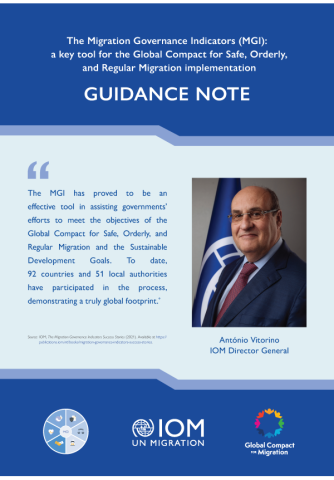Library
The Migration Governance Indicators (MGI): A key tool for the Global Compact for Safe, Orderly, and Regular Migration implementation – Guidance Note
Created in 2016 by IOM, the Migration Governance Indicators (MGI) programme is a tool that supports governments in taking stock of the comprehensiveness of their migration policies, as well as in identifying gaps and areas that could be strengthened. The MGI framework is aligned with the Global Compact for Safe, Orderly and Regular Migration as the indicators can be mapped out against all the 23 objectives of the Compact. This guidance note aims to illustrate the ways in which governments and other relevant stakeholders can use the MGI in the implementation, follow-up and review of progress towards the achievement of Global Compact objectives.
While this guidance note specifically focuses on the MGI, it is only one of the tools that can be used to support governments’ work on the Global Compact for Migration. For more information on those other tools and on the Compact more broadly, please consult the United Nations Network on Migration guidance for member States and relevant stakeholders on Global Compact implementation.
The MGI initiative is a tool created by IOM and developed with Economist Impact to help governments in assessing the comprehensiveness of their migration governance structures through 94 questions divided into six domains. Since 2016, MGI assessments have been rolled out in 92 countries and 51 local jurisdictions, and they have also informed the development of migration policies and capacity-building activities in many of those territories. This report is based on data collected at the national level in the first 84 countries that participated in the initiative between 2016 and 2021. Nested within the six domains of the Migration Governance Framework (MiGOF), the MGI consists of 94 questions that evaluate countries’ migration governance structures in a process that is voluntary, consultative (governments are engaged through all stages of the process), and sensitive to local specificities. The MGI does not establish a ranking among countries.
The collection of MGI data consists of a desk review, complemented by a series of interviews with local experts and government representatives identified with the support of the IOM office in the participating country. Over several months, these data are reviewed by IOM in consultation with participating governments. The engagement of governments throughout the process allows MGI data to reflect the procedural and institutional aspects of migration governance in a comprehensive manner, while helping these governments familiarize themselves with the information, thus facilitating its potential use to inform future policy developments.
In fact, the voluntary and consultative nature of the MGI process is one of its main added values in comparison with other data sets on migration governance (IOM, 2019a:10).
